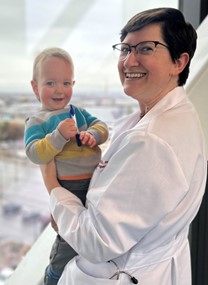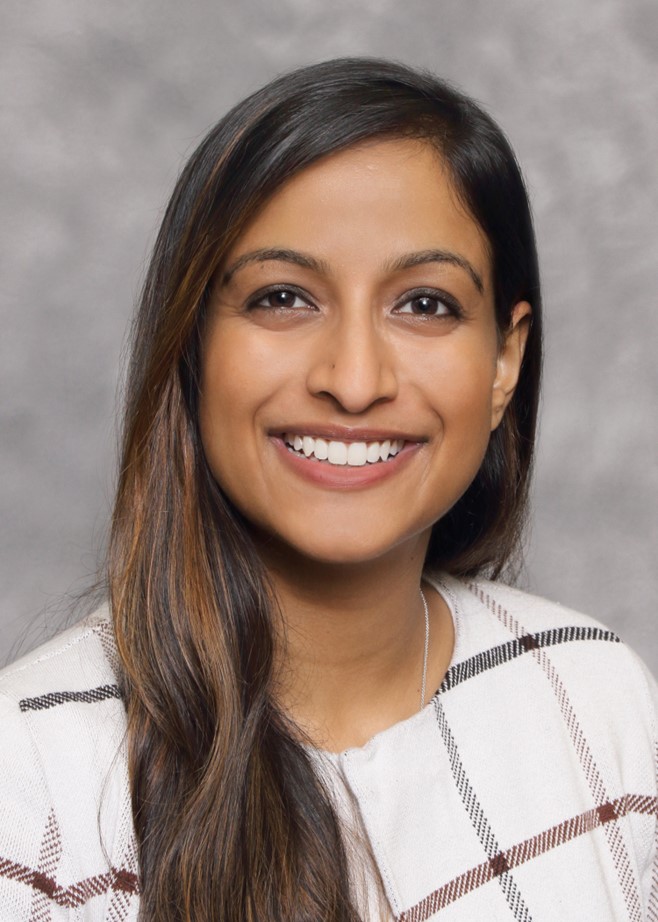
Dr. Laura DiChiacchio is a current cardiothoracic surgery fellow at the University of Utah Hospital. She will graduate in June and then join Cedars-Sinai Medical Center as an advanced fellow in thoracic transplantation and mechanical circulatory support. She completed her general surgery training at the University of Maryland/R Adams Cowley Shock Trauma Center in Baltimore, MD. She is a graduate of the Medical Scientist Training Program at the University of Rochester School of Medicine and Dentistry, where she completed a PhD in Biophysics, Structural & Computational Biology before falling in love with surgery at the end of her clinical rotations. During her general surgery training, she spent two years as a post-doctoral research fellow in the cardiac xenotransplantation laboratory of Drs. Muhammad Mohiuddin and Bartley Griffith, cementing her relationship with cardiac surgery and thoracic transplantation. She is a happy wife and proud mother to her son Henry.
What motivated you to pursue a career in surgery?
When I joined the MD/PhD program at the University of Rochester, I didn’t know whether I wanted to be a physician or a scientist – I figured this was an avenue to explore both options. The last thing I thought I would become is a surgeon. Even though I didn’t know any surgeons at the time, I was sure that most were arrogant, inflexible, and unhappy. By the middle of my third-year clerkships I had settled on becoming a pediatric oncologist and running a lab investigating tumor biology and targetable mutations. However, I was shocked by how much I loved my surgery rotation. I thought it was an aberrancy, and scheduled additional rotations and sub-internships thinking the more experience I had with surgery the quicker I would come to my senses and I would no longer be enthralled by the operating room. In reality, the more time I spent in the OR and caring for surgical patients the more I loved it. I counsel students that they should only pursue a career in surgery if it is the only thing they can picture themselves doing – and that’s how I felt by the time I completed my rotations. Surgeons make incredible impacts on their patients' lives, are able to be part of an incredible high-functioning team, and have the potential to innovate in a way that is unique to the field. I think that once I saw that, I didn’t want to do anything else.
What aspects of medical school/ residency do you feel were most influential in guiding your success?
I was so lucky to find supportive mentors at every stage along this path. There have been more times than I can count that I didn’t believe in myself. There have been many people that I admire and trust who have been the ones to say, in that moment, that it was okay if I didn’t know if I could do it – because they knew I could. Being able to train at institutions that gave me access to such inspiring and committed mentors has been critical. I think that’s been the single most important factor in my success, and is the reason that taking time to mentor others is so important to me.
What was the most challenging part of your journey thus far? What, if anything, helped you navigate the challenge?
I hesitate to write this, as it’s nuanced and I want to communicate it clearly. The birth of my son was the greatest moment of my life, and raising him has been my greatest joy. Objectively, having him at the beginning of fellowship made training more challenging in a myriad of ways that were unfair, unavoidable – and worth it. We were trying to have him during my general surgery chief year, but my biology didn’t quite cooperate with that plan. I was ill during pregnancy and struggled to operate and take call. I started fellowship behind and had to work incredibly hard to catch up. It’s invisible in some ways, what we deal with during pregnancy and post-partum. I wouldn’t change a thing. But I think it’s fair to say that having Henry during fellowship training has been the biggest physical, emotional, and mental challenge that I’ve encountered so far. My husband, Ben, was the greatest support both during pregnancy and since Henry’s birth. If I didn’t have a partner who was so hard-working, selfless, and loving we would not have been able to succeed as a family during fellowship training.
As a physician scientist, how do you plan to incorporate your research interests with a surgical career?
Being a surgeon-scientist is a tough endeavor. Research is important to me, and I’ve always tried to keep it up to varying degrees – smaller projects when clinically busy and larger, more labor-intensive projects during dedicated research time or slower clinical periods. I plan to join an academic practice with researchers who have interests aligned with mine and who can serve as close collaborators. That’s the model that I’ve personally seen work with the most success, especially for cardiac surgeon-scientists who are able to pair with PhD scientists who are dedicated to laboratory-based research. I’m interested primarily in mechanical support device development/improvement and donor graft preservation, and luckily for me this is a field ripe with ongoing research and innovation.
What advice do you have for mentees who want to follow a similar career path?
I have a lot of advice, but I think it’s important to understand how individual each person’s path and experience is! So, interpret advice from anybody through the lens of your own experience and your own life. There are several pieces of advice that I do think are important to share. (1) Assess your priorities and goals honestly; (2) Allow your priorities and goals to change, if they do; (3) When you are confident in what you want, pursue that completely. Do not let anybody shake your belief in yourself. And remember, there is no single “type” of surgeon – just people who love to operate and care for patients who need surgery.
Interviewer: Gopika SenthilKumar

Gopika SenthilKumar is a 5th year MD-PhD student at the Medical College of Wisconsin in Milwaukee, and the current Vice Chair for the Association of Women Surgeons Medical Student Committee. Gopika met Dr. DiChiacchio during the 2022-2023 AWS mentorship program cycle, and DiChiacchio has since been an incredible mentor and role model in her life. She not only models a career and life that Gopika envisions but also provides honest, balanced guidance about the challenges faced when pursuing a surgeon-scientist career path. Gopika shares how incredibly honored she feels, to be sharing a mentor spotlight on Dr. DiChiacchio.

